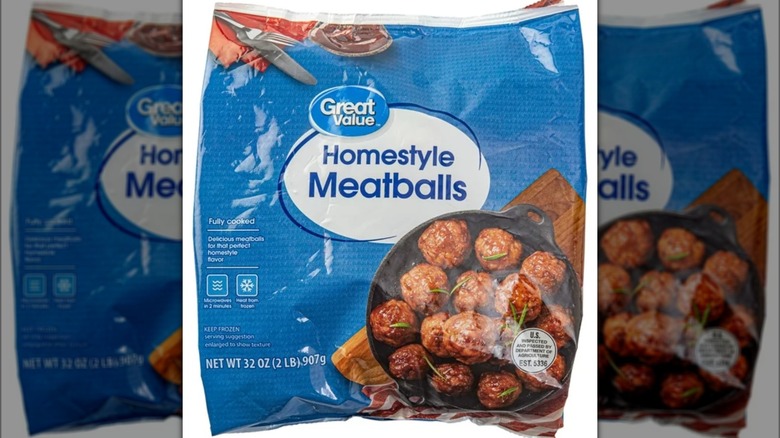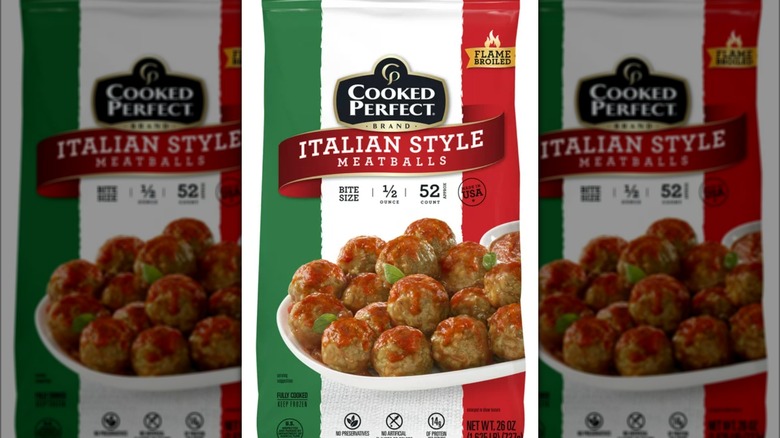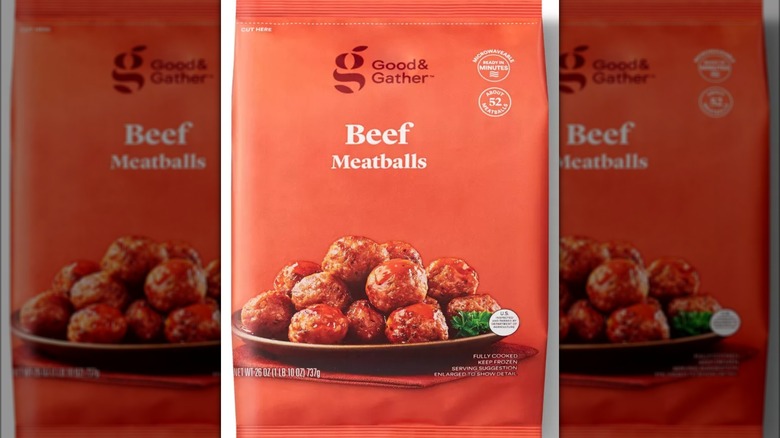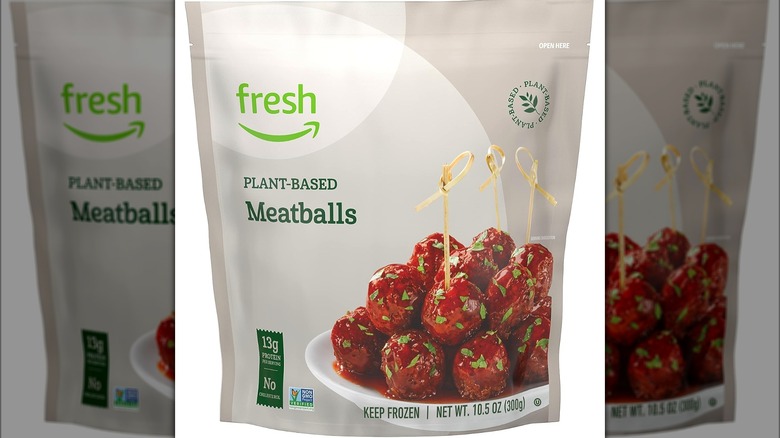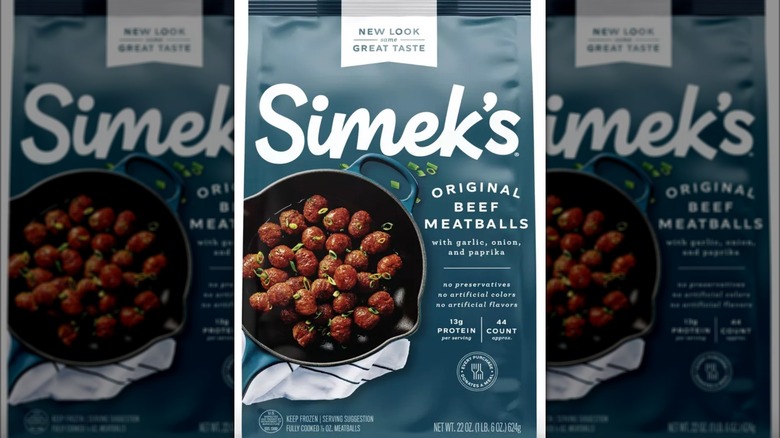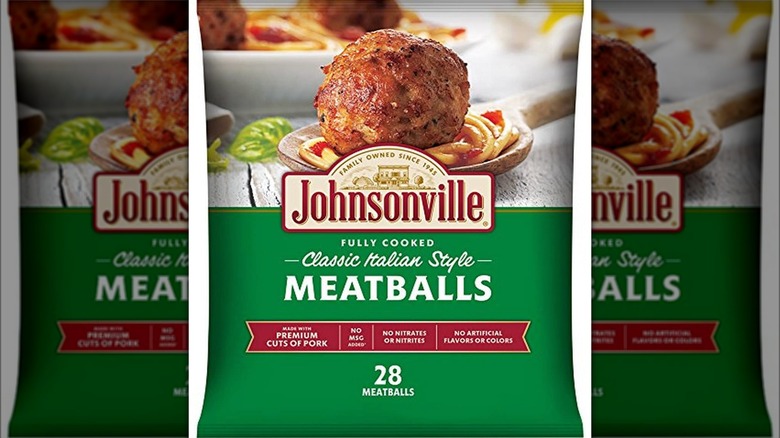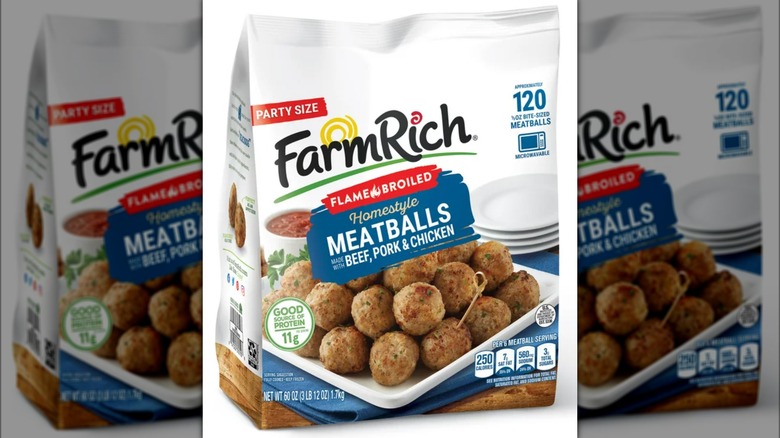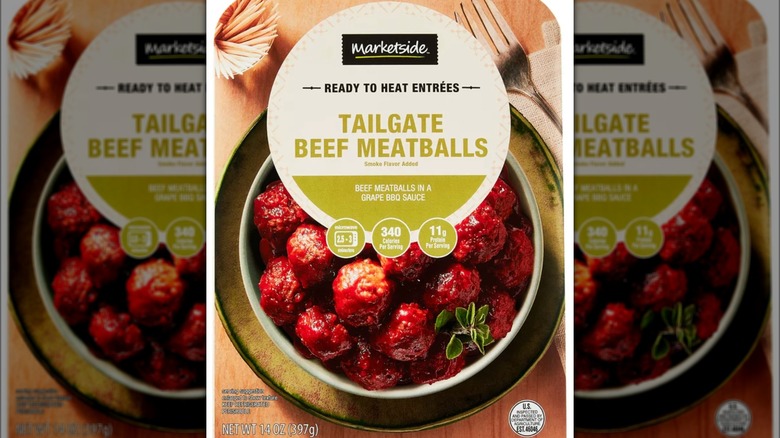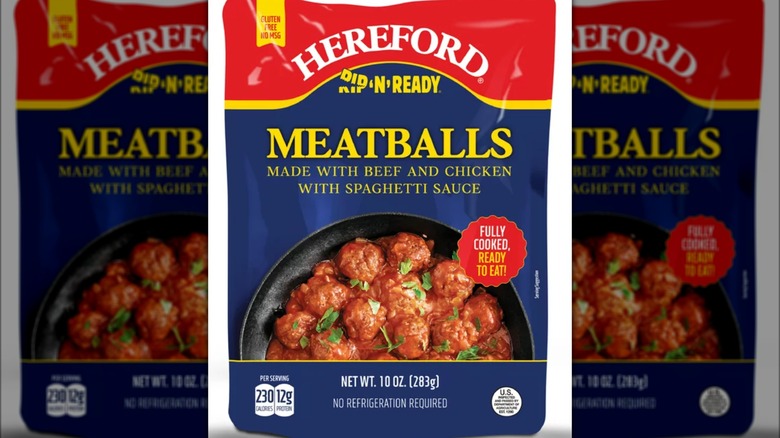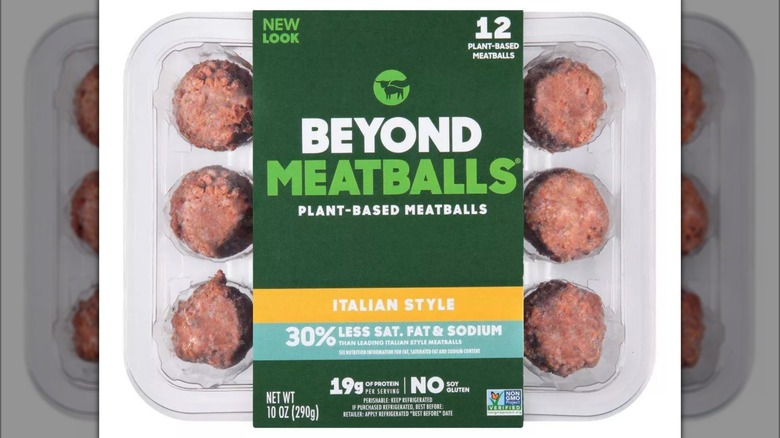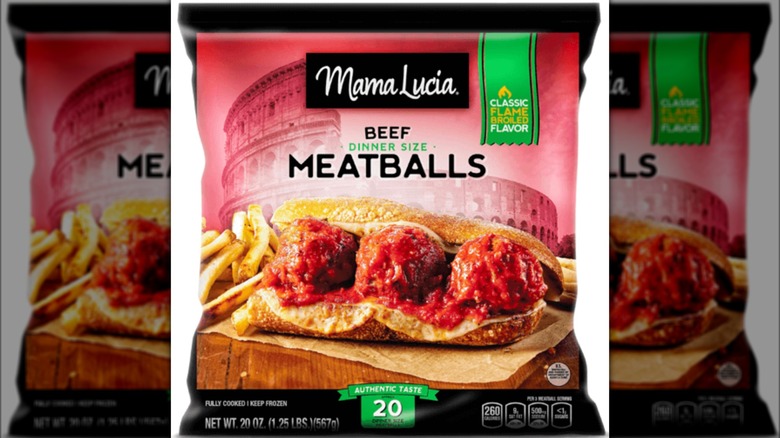The 15 Unhealthiest Store-Bought Meatball Brands
There are few foods that have as wide a reach as meatballs do. These simple constructions of ground meat, seasonings, and a binding agent — like eggs or breadcrumbs — have been popular for longer than any of us have been alive. Alleged to have been created in ancient Persia, meatballs spread across the globe until they reached the United States by way of Italian immigrants in the late 19th and early 20th centuries, with the classic spaghetti and meatballs soon becoming very popular.
And as they traveled from country to country, each culture put a spin on the recipe to create its own version. These days, you can find spiced meatballs called "kofta" in Middle Eastern countries, "thịt viên" meatballs which are a key ingredient to Vietnamese pho, and the ever-popular Swedish meatballs (also known as köttbullar) which form an essential part of your visit to IKEA. People following a plant-based diet increasingly don't have to miss out, either. More and more vegetarian and vegan meatball options are available each day, with the market size of the plant-based meatball market set to hit almost $400 million by 2033, according to Future Market Insights.
But these simple-looking protein portions can be surprisingly unhealthy if you're not making the meatballs yourself. From excessive saturated fat and sodium levels to curious ingredients you'd rather not be eating, some store-bought meatballs can be full of things that make them far from nutritious. We've rounded up (get it?) some of the biggest offenders right here.
1. Walmart Great Value Homestyle Meatballs
When things are labeled "homestyle," they come with the suggestion that they're going to invoke feelings of coziness and comfort. But Walmart's Great Value meatballs might not do that once you look at the label. The Great Value line (as the name suggests) was created to offer consumers a cheaper option, and it keeps the cost of its Homestyle Meatballs down by adding in ingredients that promote bulking, emulsification, and flavor, like breadcrumbs, soy protein concentrate, and dextrose. None of these ingredients, unfortunately, are particularly nutritious. And it's curious that these meatballs have three sources of protein (beef, pork, and soy) but are fairly low in protein per serving.
However, what really catches our eye about these meatballs is the trans fats inside them. Great Value Homestyle Meatballs have 0.5 grams of trans fats per serving, and while that doesn't sound like a lot, those numbers can add up if you're getting them from other dietary sources. It's worth bearing in mind that in an ideal world, you should consume no trans fats whatsoever. Not only does your body not need them, but they can also negatively impact your cholesterol levels, contributing to the risk of chronic cardiovascular illness (via MedlinePlus).
2. Cooked Perfect Italian Style Meatballs
Cooked Perfect is a brand owned by Home Market Foods, a company that's been operating for over half a century and places top-quality, consumer-first offerings at the top of its agenda. So between that and the promise of perfection in its name, you would hope that its meatballs will knock it out of the park.
But while its meatballs may taste good, they largely do so because of the high levels of sodium inside each bite. Each serving of meatballs contains 580 milligrams of sodium, just shy of a quarter of the maximum you should be consuming daily. Crucially, while we need sodium to survive, the average body only needs around 500 milligrams each day for our bodies to function normally, according to Harvard T. H. Chan School of Public Health. You'll get more than that in just a few of these meatballs, and that's not accounting for the rest of your diet.
Additionally, Cooked Perfect meatballs historically haven't had the best track record health-wise. In 2019, well over 50,000 pounds of its meatballs had to be recalled from the market, due to milk and wheat allergens being present in the product despite not being on the label.
3. Earth's Best meatballs
If your kids still aren't ready to experiment with their diets, spaghetti and meatballs are usually a pretty solid bet for dinnertime. And upon the first appearance, organic food company Earth's Best's meatballs appear to hit the spot. The brand promises no antibiotics or added hormones used on the cows that supply its Mini Beef Meatballs, and the smaller size of the meat pieces seems to make it a healthier choice.
However, one look at its nutritional info and its suggested serving size tells a different story. Earth's Best advises 16 meatballs per serving, and this will supply almost half of the daily value of saturated fat for your kids. To add to this, it will provide over a fifth of their daily value for sodium. Importantly, children need fats just like adults do, and limiting them too much can have an impact on their brain development, says KidsHealth. But giving your kids too much fat, especially saturated fat, can lead to weight gain, and with that comes a host of potential health issues like high blood pressure and diabetes.
Instead, you should try to focus on healthy eating for your child, which will play a vital role in their development, and prioritize foods with unsaturated fats in them. Having said that, every kid deserves a plate of spaghetti and meatballs now and again — but it might be worth looking for a lower-sodium, lower-saturated-fat option.
4. Target Good & Gather Beef Meatballs
With its subtle, muted packaging, and high-quality pictures of mouth-watering food adorning its containers, Target's Good & Gather range has a mature aesthetic that promises quality. So it's a real shame that doesn't necessarily pan out in its ingredient lists. One key example of this is the Good & Gather Beef Meatballs, which are far from the most nutritious option out there.
Despite having a pretty good amount of protein per serving, this product is also abundant in saturated and trans fats. These meatballs are also pretty salty, with 520 milligrams per serving.
It's also useful to note that while this product states that it has no added sugars, it does seem to contain some, in the form of corn syrup solids. This is a dried form of regular corn syrup, which is well-known for its impact on blood sugar levels and the potential consequences that come with consuming it too frequently, according to Well Life Medical. Presumably, the amount that's in each meatball is low enough for its weight not to be included in the added sugar count — but it is still worth noting if you're trying to avoid it entirely.
5. Amazon Fresh Plant-Based Meatballs
Fresh by name, fresh by nature? That's the promise that Amazon seems to make with its Amazon Fresh line, which works to get your groceries on the table fast, with no impact on quality or taste. But just because its Plant-Based Meatballs arrive at your door ready to go, doesn't mean they haven't been through a lot of processing first. These meatballs are full of processed ingredients, like enriched wheat flour, methylcellulose, and wheat gluten, all of which are designed to give the product a more consistent, satisfying texture.
However, these ingredients also have drawbacks. Methylcellulose, for instance, is a thickening and bulking agent, but Cleveland Clinic notes it can also have a laxative effect. While you generally have to consume 1 gram or more daily for it to have a notable impact, there's no indication of how much is in these meatballs. Enriched wheat flour also gives us cause for concern. The word "enriched" in this ingredient name refers to the inclusion of vitamins and minerals which are lost during wheat processing. But that doesn't make it much healthier, and at the end of the day, enriched wheat flour is still a highly-refined carbohydrate, which can spike your blood sugar, and which will have limited nutritional value beyond the nutrients that are added back into it.
6. Simek's Original Beef Meatballs
Simek's has a lot to be proud of as a brand. Since starting in 1970, the company has donated over 8 million meals to food banks, and the women-owned business partners with rePurpose Global, to seek to offset its use of plastic packaging. Unfortunately, though, the nutritional value of some of its products, like its Original Beef Meatballs, leaves a lot to be desired.
The most striking thing about Simek's Original Beef Meatballs is the sky-high sodium content. In 85 grams' worth of meatballs, there are 790 milligrams of sodium, over a third of your recommended maximum daily amount. This is far more than the amount that competitors use in the same quantity of their products and calls into question exactly why they add so much. Indeed, the amount of sodium is noticeable on a taste level, with one shopper via Target pointing out that they were too salty to eat. To add to this, Simek's meatballs also contain trans fat and a high amount of saturated fat.
7. Trader Joe's meatballs
The products at Trader Joe's are generally pretty top-notch, and its Italian Style Meatballs seem to be too. With their larger size, these meatballs make a refreshing change to the smaller ones that you'll typically find in your freezer section, and they have a meaty, plump appearance.
But appearances can be deceiving. Inside these meatballs, in fact, there doesn't seem to be that much meat at all. You get 11 grams of protein in every two meatballs, which is far less than a lot of other alternatives on the market. And remember that as there are just four calories in every gram of protein, that means that almost 200 of those calories are coming from other sources — mainly fat. These meatballs are especially fatty, and there are 8 grams of saturated fat in each serving. It may give them a succulent, juicy texture, but it may also impact your cholesterol levels, according to Heart UK.
Additionally, Trader Joe's meatballs also contain a few grams of sugar in each serving. In savory foods, sugar can operate as a balancing element for the other flavors going on -– but it can also have somewhat of a crave-inducing effect, making you want to consume more of it. It's also worth pointing out that a lot of other meatball brands on the market don't have any sugar in their nutritional information.
8. Walmart Great Value Turkey Meatballs
Turkey meat is commonly used as a substitute for red meat in processed foods like sausage and bacon, and many people prefer it for both its lighter taste and its lower fat content. So turkey meatballs definitely make sense as a healthier choice. Walmart clearly became aware of this when it started offering its Great Value Turkey Meatballs. But great value doesn't strictly mean great nutritional content.
While these meatballs are certainly way lower in fat than the retailer's red meat meatballs, they suffer in other areas. This product (made from unappealing-sounding "mechanically separated turkey") has a very high sodium content, with ¼ of your daily value covered in just six meatballs. Sodium is frequently added to processed poultry products as a way to boost flavor and make them last longer, but it also has the added effect of skyrocketing your sodium intake to potentially unhealthy levels. Further flavor enhancement is added to this product through added sugars, with a gram in each serving.
9. Johnsonville meatballs
Wisconsin-based food company Johnsonville has been on a serious journey since it was founded in 1945. From a humble butcher's shop (in, you guessed it, Johnsonville), the outfit grew to become a nationwide sensation, and alongside its signature sausages, it also makes a variety of meatballs.
But these meatballs are far from the most nutritious ones you can find — far from it, in fact. Johnsonville Classic Italian Style Meatballs have high proportions of fat and sodium in each ball. The fat content, in particular, raises its caloric count way higher than other competitors. Additionally, these meatballs have barely any vitamins or minerals.
However, there's one ingredient included that makes these meatballs stand out as particularly worrisome. Johnsonville Italian Style Meatballs contain propyl gallate, an additive used to stop fat from spoiling. However, this ingredient has long been considered controversial, with research appearing to point toward its potential to increase cancer risk when eaten in small amounts, according to the Center for Science in the Public Interest. It has been suggested that propyl gallate would benefit from further study to properly identify its effects on humans — but until then, you might want to give it a miss.
10. Farm Rich meatballs
Farm Rich's meatballs seem squarely aimed at the appetizers market, with its party-size Flame Broiled Homestyle Meatballs coming in a bumper 60-oz pack. But what's also pretty bumper is the size of its ingredients list. Over 25 ingredients go into making each of these little meatballs, and some of them, like corn oil, are a little questionable. While corn oil does have some positives, with its high vitamin E content and potential antioxidant effect, it's also pretty high in omega-6 fatty acids. When eaten alongside heart-healthy omega-3's, these fatty acids aren't too impactful. But when they're consumed in too high of a quantity without balancing them out with other, healthier fats, they can have an inflammatory effect, according to a 2018 review.
Additionally, Farm Rich Flame Broiled Homestyle Meatballs have a fairly high level of added sugars. In each serving, there are three grams of added sugars, for a total of 6% of your daily value. That doesn't feel like a massive amount until you remember that this is a savory food item and that you'll probably be having added sugars from other (and way sweeter) dietary sources — and when you remember that lots of other meatballs don't have added sugars at all.
11. Marketside meatballs
Whereas most meatball brands market their product as being well-paired with a tomato sauce, Marketside instead looks to sell its meatballs with an alternative flavor. As such, its Beef Tailgate Meatballs, which come drenched in a grape BBQ sauce, is a good choice if you're looking for something slightly different from a classic spaghetti supper.
But it's far from a good choice if you're watching your nutrition. In fact, Marketside's meatballs are far and away the least nutritious out there, with a shocking amount of sodium and added sugars. In every 140-gram serving, there are 1,430 milligrams of sodium, almost two-thirds of the amount that you should be getting every day. Additionally, there's a frightening 23 grams of added sugar, which is pretty much the full recommended allowance for women each day. For context, this is in a food item that only clocks in at 340 calories in each serving — meaning that you have to limit the added sugars and sodium significantly from everything else you eat in a day if you want to stay within the daily values.
Remember, you don't need added sugars in your diet at all. And while they make things tastier, they can also have a significant impact on your weight and heart health, says the American Heart Association. It appears that much of the sodium and added sugar content comes from the BBQ sauce, but unless you're willing to scrape it off every meatball, it's something that you're likely stuck with.
12. Hereford meatballs
Hereford's Meatballs with Spaghetti Sauce product is pretty convenient. Coming in a handy pouch, to serve it, all you need to do is microwave, rip, and pour. However, that might be the best thing about it once you take a look at its nutrition label. This product has a totally massive amount of sodium in every portion, especially relative to its ⅔ cup serving size. There are over 1,000 grams of sodium per portion. Admittedly, this is due to the product containing a combination of meatballs and sauce, both of which contain their own sodium content. But as it's so easy to buy lower-sodium meatballs and low-sodium jarred tomato sauce and put them together, we struggle to see why it's worth all that extra salt.
Additionally, Hereford Meatballs with Spaghetti Sauce contain 5 grams of sugar per serving. And while the product arguably cuts back somewhat on fat due to using a combination of chicken and beef, there's still a pretty large amount of saturated and trans fats. And these high proportions aren't necessarily reflected in its calorie count.
13. Beyond Meatballs
Beyond Meat has only been around since 2009, but it's one of the greatest success stories of the plant-based food market. In just 14 years, the company has grown to a worth of $9 billion worldwide, and we're pretty sure it's not going to stop there. One of the company's reasons for creating plant-based meat alternatives is to promote a more nutritious diet. So it's unfortunate that its meatballs don't appear to reflect that. While its Italian Style Plant-Based Meatballs seem to indicate that it's more nutritious than other brands, it's still not the healthiest option you can go for. Beyond Meat's meatballs have pretty high levels of sodium and saturated fat.
The main problem, however, lies in the fact that there's an assumption that plant-based meat products are way healthier than meat alternatives, so they can be eaten more frequently. And that psychology can lead to people over-consuming them, and making poor nutritional choices. "The key thing is that any food that has been highly processed should be eaten mindfully," author and registered dietitian Renee McGregor told The Guardian. "So not necessarily avoided completely, but I wouldn't recommend a vegan sausage weekly due to the high salt content and most likely list of additives and preservatives." We'd imagine that McGregor might say the same about these meatballs.
14. Carando meatballs
Carando Italian Uncooked Abruzzese Meatballs will undoubtedly appeal to folks who want their meatballs to look like, well, meat. Unlike already-cooked meatballs, which can look slightly one-note and resemble strange brown golf balls, these balls have a pleasingly pink surface that's begging to be fried.
These meatballs also have a pretty solid protein content, with 19 grams per serving, making them one of the meatiest offerings on the market. However, it's their saturated fat content that lets them down. In each serving, there are 10 grams of saturated fat, which is half of the full daily value. There's been a lot of debate around saturated fats in recent years and exactly how unhealthy they are for you, but the fact remains that numerous studies have shown its link with numerous health conditions like heart disease, liver disease, and even prostate cancer, according to Everyday Health.
Small amounts of saturated fat may be fine for most people, but generally, you want to opt for foods heavy in these kinds of fats in ways that augment a dish, instead of placing them right in the center of your meal. And these meatballs do just that. Furthermore, Carando's meatballs also have a fairly hefty amount of sodium, with 710 milligrams per serving.
15. Mama Lucia meatballs
Since Rosina started selling sausages in 1963, it's come a long way. In those 60 years, it's expanded not only in size but in the brands it now owns and operates. One of these, Mama Lucia, focuses exclusively on meatballs, so you would imagine that it's a safe bet for quality and goodness.
However, there's one thing that these meatballs seem to be lacking: Meat. Mama Lucia's Beef Meatballs, for example, contain approximately 10 grams of protein per serving, which is far lower than you might expect for its 85-gram serving size. It appears that the brand plumps up its meatballs through fillers and bulking agents, including bread crumbs, textured soy flour, and an "isolated oat product." It also puts a huge amount of fat into its products.
Mama Lucia Beef Meatballs also contain sugar from a few different sources, including corn syrup solids. And to top it all off, their vitamin and mineral content is somewhat lacking. While the iron and potassium content is fairly good, with 8% and 6% of your daily value respectively, there isn't much of anything else.

